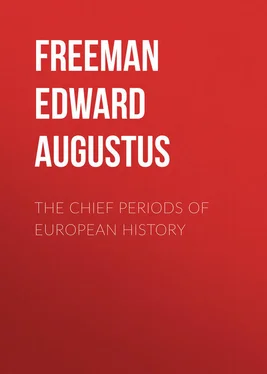Edward Freeman - The Chief Periods of European History
Здесь есть возможность читать онлайн «Edward Freeman - The Chief Periods of European History» — ознакомительный отрывок электронной книги совершенно бесплатно, а после прочтения отрывка купить полную версию. В некоторых случаях можно слушать аудио, скачать через торрент в формате fb2 и присутствует краткое содержание. Жанр: foreign_antique, foreign_prose, на английском языке. Описание произведения, (предисловие) а так же отзывы посетителей доступны на портале библиотеки ЛибКат.
- Название:The Chief Periods of European History
- Автор:
- Жанр:
- Год:неизвестен
- ISBN:нет данных
- Рейтинг книги:4 / 5. Голосов: 1
-
Избранное:Добавить в избранное
- Отзывы:
-
Ваша оценка:
- 80
- 1
- 2
- 3
- 4
- 5
The Chief Periods of European History: краткое содержание, описание и аннотация
Предлагаем к чтению аннотацию, описание, краткое содержание или предисловие (зависит от того, что написал сам автор книги «The Chief Periods of European History»). Если вы не нашли необходимую информацию о книге — напишите в комментариях, мы постараемся отыскать её.
The Chief Periods of European History — читать онлайн ознакомительный отрывок
Ниже представлен текст книги, разбитый по страницам. Система сохранения места последней прочитанной страницы, позволяет с удобством читать онлайн бесплатно книгу «The Chief Periods of European History», без необходимости каждый раз заново искать на чём Вы остановились. Поставьте закладку, и сможете в любой момент перейти на страницу, на которой закончили чтение.
Интервал:
Закладка:
Edward A. Freeman
The Chief Periods of European History / Six lectures read in the University of Oxford in Trinity term, 1885
PREFACE
These are the Lectures referred to in the last paragraph of the Preface to the course on the “Methods of Historical Study,” lately published. I have added to them the second of two articles which appeared in the Contemporary Review for 1884. The former of them, “Some Neglected Periods of European History,” I have not reprinted, as its substance will be found in the present course. The second, “Greek Cities under Roman Rule,” as dealing somewhat more in detail with some points which are barely glanced at in the present course, seemed to make a fitting Appendix Конец ознакомительного фрагмента. Текст предоставлен ООО «ЛитРес». Прочитайте эту книгу целиком, купив полную легальную версию на ЛитРес. Безопасно оплатить книгу можно банковской картой Visa, MasterCard, Maestro, со счета мобильного телефона, с платежного терминала, в салоне МТС или Связной, через PayPal, WebMoney, Яндекс.Деньги, QIWI Кошелек, бонусными картами или другим удобным Вам способом.
to it.
I find that the same thought as to the political result of modern scientific inventions which is brought out at pp. 184 Конец ознакомительного фрагмента. Текст предоставлен ООО «ЛитРес». Прочитайте эту книгу целиком, купив полную легальную версию на ЛитРес. Безопасно оплатить книгу можно банковской картой Visa, MasterCard, Maestro, со счета мобильного телефона, с платежного терминала, в салоне МТС или Связной, через PayPal, WebMoney, Яндекс.Деньги, QIWI Кошелек, бонусными картами или другим удобным Вам способом.
, 185 Конец ознакомительного фрагмента. Текст предоставлен ООО «ЛитРес». Прочитайте эту книгу целиком, купив полную легальную версию на ЛитРес. Безопасно оплатить книгу можно банковской картой Visa, MasterCard, Maestro, со счета мобильного телефона, с платежного терминала, в салоне МТС или Связной, через PayPal, WebMoney, Яндекс.Деньги, QIWI Кошелек, бонусными картами или другим удобным Вам способом.
of these Lectures is also brought out in the Lecture at Edinburgh, reprinted in my little book “Greater Greece and Greater Britain,” published last May. This kind of thing is always likely to happen in lectures given in different places. It seemed to me that the thought came naturally in both lectures, and that either would lose something by its being struck out. As for those who may be so unlucky as to read both, I can only say that a thought which is worth suggesting once is worth suggesting twice. At least I have often found it so in the writings of others, specially in those of Mr. Grote.
The two courses of Oxford lectures which have now been printed are both introductory. In this present course the division into periods which is attempted is, on the face of it, only one among many which might be made. Another man might divide on some principle altogether different; I might myself divide on some other principle in another course of lectures. My present object was to set forth as strongly as possible, at the beginning of my teaching here, the main outlines of European history, as grouped round its central point, the Roman power. The main periods suggested by such a view of things are those which concern the growth and the dying-out of that power – Europe before the growth of Rome – Europe with Rome, in one shape or another, as her centre – Europe since Rome has practically ceased to be. When this main outline, a somewhat formal one, has once been established, it is easy at once to fill in and to subdivide in an endless number of ways and from an endless number of points of view. Thus I have at present little to do with the political developement of particular nations. Of some branches of that subject I have treated at some length in other shapes; I may, in the course of my work here, have to treat of others. But they are not my subject now. Nor have I now to deal with the great events and the great institutions of Europe, except so far as they helped to work out the one main outline which I have tried to draw. The power of the Popes may be looked at in a thousand ways; it concerns me now only in its strictly Roman aspect, as one, and the greatest, of the survivals of Roman power. The great French Revolution again may be looked on in a thousand ways. It concerns me now as having led to the sweeping away of the last relics of the old Roman tradition, and as having set up for a while the most memorable of conscious imitations of the Roman power. I say all this, that no one may be disappointed if he fails to find in this thin volume even a summary of all European history, much less a philosophical discussion of all European history. My business now is simply to draw an outline, ready either for myself or for others to fill up in various ways.
These two introductory courses make up the result of my public work as Professor during my first year of office, 1884-5. Besides these, there was the minute study of Gregory of Tours with a smaller class, followed by the like study of Paul the Deacon. In my second year, 1885-6, I have, besides this study of texts, been engaged, as I said in my former Preface, with public lectures of a much more minute kind, on the history of the Teutonic nations in Gaul. These I do not design to publish as lectures. If I live long enough, I trust to make my way through them to an older subject of mine, the Teutonic settlements in Britain. Neither the history of Gaul nor the history of Britain in the fifth century A.D. can be fully understood – it follows that the whole later history of the two lands cannot be fully understood – without comparing it with the history of the other land. In dealing with Goths, Burgundians, and Franks, the comparison and contrast with Angles, Saxons, and Jutes, if it sometimes passes out of the immediate sight, must never be allowed to pass out of the mind’s eye. The broad light of the history of Gaul is the best comment on the yet more instructive darkness of the history of Britain.
This subject brings me at once within the range of controversy. I believe that the doctrine for which I have struggled so long, the doctrine, as I have somewhere put it epigramatically, that we, the English people, are ourselves and not somebody else, is now often held to be altogether set aside. Only a few old-fashioned people like myself are thought likely to maintain it. Yet, whenever I come across these new lights, I always begin to doubt whether those who kindle them have ever minutely contrasted the circumstances or the results of the Teutonic settlements in Britain with those of the better known Teutonic settlements in Gaul. Now this is the very root of the matter; in discoursing of the phænomena of Gaul, I have always had an eye to the phænomena of Britain, and I trust some day, if I am ever able to work through my materials, to set forth the contrast in full. To this object the lectures which I am now gradually giving will, I hope, serve; but it will be best to put no essential part of them forth to the world till I can deal with the subject as a whole. Till then I will simply put on record, for the benefit of those who may have heard statements attributed to me which they have certainly not read in my writings, that I have nowhere said, because I never thought, that every one Briton was necessarily killed, even in those parts of Britain which became most thoroughly Teutonic. At the same time, I think that every one who really reads his Gregory and his Bæda, every one who carefully compares the map of Gaul with the map of Britain, every one who stops to think over the history of the French and the English tongues – and the history of the Welsh tongue too will not do him any harm – may possibly come to the conclusion that the doctrine that Englishmen after all are Englishmen has really some little to be said for it.
Читать дальшеИнтервал:
Закладка:
Похожие книги на «The Chief Periods of European History»
Представляем Вашему вниманию похожие книги на «The Chief Periods of European History» списком для выбора. Мы отобрали схожую по названию и смыслу литературу в надежде предоставить читателям больше вариантов отыскать новые, интересные, ещё непрочитанные произведения.
Обсуждение, отзывы о книге «The Chief Periods of European History» и просто собственные мнения читателей. Оставьте ваши комментарии, напишите, что Вы думаете о произведении, его смысле или главных героях. Укажите что конкретно понравилось, а что нет, и почему Вы так считаете.












